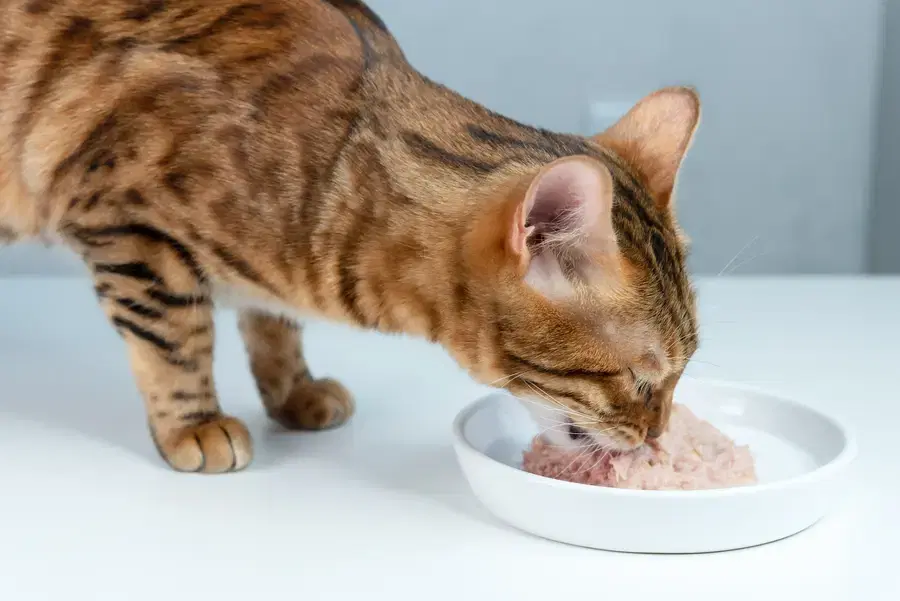The vegetable world’s version of a costume party, squash, comes in all shapes, sizes and colors. Whether it’s butternut, acorn, or zucchini, squash is a versatile addition to many dishes. These varieties are popular across the globe, and for good reason given their nutritional value. But what happens when our cats decide to crash this costume party?
In general, most human foods aren’t ideal for cats. As obligate carnivores, their digestive systems are built for processing meat, not fruits or vegetables. Because of this, cats can’t efficiently absorb nutrients from plant-based foods, and too much of them can cause indigestion or other stomach issues.
That said, squash is one of the rare exceptions. Certain types like zucchini butternut squash and pumpkin, are safe for cats in moderation and can even offer some mild health benefits.1
Here are some of the health benefits that squash can offer cats -
Low in calories making it a light treat
Good source of hydration because of its high water content
High in fiber that helps digestion and with relieving constipation
Fiber also helps cats feel full for a longer time, thus supporting weight loss
Hairball control as the fiber helps move hair through the digestive system
Packed with vitamins, especially in varieties like summer squash
But before you start filling your cat’s food bowl with squash, remember - terms and conditions apply. Moderation and preparation matter just as much as the benefits.
Squash can be a double-edged sword. If fed excessively, the high fiber that helps in digestion can cause an upset stomach in cats. There's also a chance that some cats may have an allergic reaction to squash.2,3
Hence, squash should only be given as an occasional treat and in moderation. It should never replace your cat’s existing meat-based diet.
Can Cats Eat Spaghetti Squash?
Yes, you can feed your cat spaghetti squash as well. Just make sure you remove the shell and wash it thoroughly. Never feed them any kind of squash raw. Always ensure that it is plain and cooked without any seasonings (not even salt).
Is Squash or Pumpkin Better for Cats?
This is like asking, "What’s better for you? Fruit or a banana?"
Pumpkin is a type of squash, and it’s one of the best known for being safe and even beneficial for cats when fed in moderation as an occasional treat.
If your question is which squash variety is best for cats, the answer isn’t so simple. Most types of squash, including pumpkin, zucchini, and butternut squash, contain healthy amounts of vitamins, fiber, and water that can support digestion and hydration in cats. Butternut squash is also rich in potassium, which supports your cat’s heart, brain, and muscle health.2
Is Squash Good for Cats with Diarrhea?
Feeding a small amount of squash to a cat with diarrhea can actually help regulate digestion and firm up loose stools, thanks to its high fiber content. Since diarrhea can also cause a loss of essential nutrients, offering a little boiled squash may help restore some of the vitamins and minerals your cat’s body needs.1
Having said that, moderation is key. Overfeeding squash can have adverse effects on a cat's digestive system.
More About Spot Pet Insurance
Squash is generally safe for cats to eat. However, there may be times when your feline friend gets into foods they shouldn’t, or you might unknowingly offer something that upsets their stomach or causes other health issues. If you’re wondering which human foods could be harmful to your cat, here are some to watch out for -
Chocolate
Onions
Garlic
Grapes
Raisins
Tomatoes
Cherries
Raw fish, meat or eggs
Citrus fruits
For the times when you have to take your cat to the vet unexpectedly, you can get reimbursed up to 90% of the eligible costs with pet health insurance.
Cat Insurance helps to provide pet parents with additional financial support and peace of mind when it comes to the health and wellness of their pets. With a Spot plan, pet parents can receive up to 90% cash back on eligible vet bills. This way pet parents can focus on caring for and supporting their pets. Spot's also offers preventive care add-ons, which can help cover the eligible costs of spaying and neutering, dental cleaning, vaccinations, and other routine care services.
Get a quote today!

With 10 years of experience as a pet parent, I aim to empower pet owners with insights into pet insurance and maintaining their pet's well-being. I aspire to be a trusted source, combining knowledge with a commitment to the welfare of our beloved pets.
*Jan 2019 to Aug 2024 Spot Pet Insurance Services, LLC claims data.
Adams, Christian. "Can Cats Eat Squash?" Catster, 11 Sep. 2025, https://www.catster.com/nutrition/can-cats-eat-squash/.
Bayne, Emily. "Can Cats Eat Butternut Squash?" Wag, 16 Jun. 2024, https://wagwalking.com/wellness/can-cats-eat-butternut-squash#are-there-dangers-of-overfeeding-my-cat-butternut-squash?.
Veterinary Team. "Can Cats Eat Squash?" Dial a Vet, 4 Aug. 2025, https://www.dialavet.com/blog/can-cats-eat-squash.
The information presented in this article is for educational and informational purposes only and does not constitute or substitute for the advice of your veterinarian.












